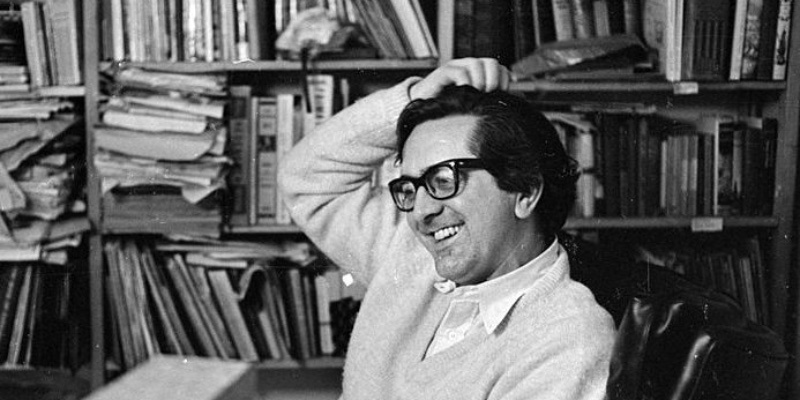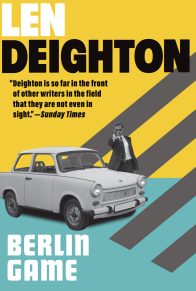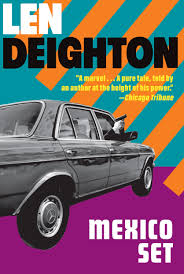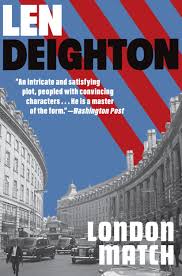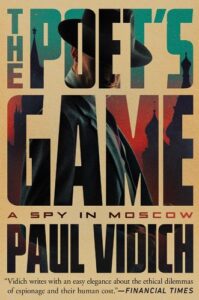This year marks the 40th anniversary of the publication of Len Deighton’s first Bernard Samson trilogy – Berlin Game, Mexico Set, and London Match – which is arguably the second most influential trio of spy novels ever published. It holds a revered spot in the pantheon of literary espionage; some critics would even put it ahead of the Smiley trilogy by Le Carré. Grove Atlantic reissued these novels in the US and Canada as part of its plan to release all thirty-one titles in Deighton’s oeuvre, with fourteen already out and the remaining scheduled to be released in the next eighteen months.
Morgan Entrekin, Grove Atlantic President, negotiated the acquisition with Deighton’s UK literary agent, who was meeting with Entrekin on another matter and happened to ask if Grove was interested in any of Deighton’s titles.
“Which ones?” Entrekin asked.
“All of them.”
Entreken was flabbergasted and quickly agreed to reissue Deighton’s entire body of work in the US – new cover art and several new introductions, including a foreword to Bomber by Malcolm Gladwell.
Entrekin explained his decision to me. “Deighton is one of the three or four most important writers of espionage fiction. On one end of the spectrum this is Le Carré, a master of characters whose novels are full of resonance, and on the other end of the spectrum there is Ludlum, whose books are action, action, action. Deighton is in the middle. His novels have complex plots, great characters, remarkable settings, and the prose is so good.”
Deighton’s books remain in print in the UK, but rights held by their original North American publishers had lapsed. Deighton, now 95, earned worldwide recognition in 1962 when his first novel, The Ipcress File, was published in England. His UK publisher didn’t expect it to become a bestseller and its initial print run of 4000 copies sold out in several days. The book went on to become an international bestseller in the US, UK, and France, selling more than 2.5 million copies in three years.
The Ipcress File came out a few months after the release of the first James Bond movie, “Dr. No.” In a 1966 essay Deighton wrote for Playboy, he attributed his novel’s booming success to the spy craze in England and America. Spy fever, he wrote had taken over, and where possible, book jacket copy was changed to insert the word ‘spy,’ and clever marketing agents sold “spy scent, spy trousers, film rights, and series contracts.”
Deighton’s sarcasm aside, his novel was popular in part because it wasn’t cut from Fleming’s spy cloth. Deighton’s first-person hero (unnamed in the novel but given the name Harry Palmer in the 1966 movie starring Michael Caine), is a bespectacled, low-salaried, slightly overweight junior employee in the War Office who is dispatched to a shabby office on Charlotte Street in Soho to investigate the disappearance of a missing British nuclear scientist. Harry Palmer is the anti-James Bond and there is no love interest to speak of in the book. Bond is a Commander and Palmer a lowly sergeant; Bond is English upper class, like his creator, Fleming (Eton and Sandhurst), and Palmer is the product of an English grammar school (like Deighton).
Bond and Palmer offered different spy-soldier masculinities to a quickly changing British society. Palmer represented the laconic cool of a new class of working-class hero, brilliantly captured by Caine in the movie version of the novel. He cooked, wore glasses, and he was quick witted – like Deighton. The fictional Bond, unlike the fictional Palmer, ate in restaurants and didn’t have a clue how to prepare a meal.
Deighton, who was 33 when The Ipcress File came out, was surprised by its success. “I had never had an ambition to be a writer and I was perfectly happy and adequately paid as an illustrator.”
After mandatory national service in the RAF, he worked in ad agencies for three years, living near Soho, which provided the setting for parts of the novel. Deighton grew up as a big reader, devouring a book a night he claimed – Chandler, H. G. Wells, Plato. In the preface to the Penguin Random House UK edition of the novel, Deighton writes that he wasn’t “taking myself too seriously when, on a holiday diversion, I took a school exercise book and a fountain pen, and started this story. Knowing no other style I did it as though I was writing a letter to an old, intimate and trusted friend. I immediately fell into the first-person style without knowing much about literary alternatives.”
Deighton rarely sat down for interviews to discuss his writing, but he offered insights in his Playboy essay, where he discussed how he came to write the novel. He dismissed writing a detective novel because he didn’t know enough about regular police business and instead chose an intelligence agent who could lie to anyone if it suited his purpose, and the spy novel allowed him to use the political background that interested him – the Cold War.
“I liked to have a problem, or enigma, that could follow the action of the book, but I wanted the book to be ragged and untidy, like life is. I wanted characterization and dialogue to control the enigma rather than the other way around, as had been the case with the detective novels of the thirties, which had become puzzles rather than stories. Above all, I was interested in the permutations of deceit and mistakes.”
Deighton wrote that The Ipcress File owed a debt to Raymond Chandler, particularly his way of advancing plot through dialog, but he said the novel was inspired by the 1953 Hollywood movie “Beat the Devil.” It’s an hilarious adventure-comedy directed by John Huston with a script by Huston and Truman Capote, starring Humphrey Bogart and Gina Lollobrigida in her American movie debut, and featuring Peter Lorre. Huston made the film as a loose parody of his 1941 film, “The Maltese Falcon,” in which Bogart and Lorre also appear. Capote said of the movie: “John Huston and I decided to kid the story to treat it as a parody. Instead of another Maltese Falcon, we turned it into a spoof of this type of film.”
Deighton said the movie “poked fun at greed, fakery, and the English class system, and produced terror and belly laughs. At the box office it boomed.”
Revisiting the movie recently, it is easy to see why Deighton was drawn to it. The movie’s affected English aristocrat is unmasked as a fake who is pushed forward by his ambitious American wife and the absurd plot revolves around Uranium mines in Africa. Capote’s dialog is as sharp as a knife. (“He didn’t mean to break his word, it’s just that he forgot he gave it.”)
Dialogue in The Ipcress File has the same razor’s edge and it’s clear why “Beat the Devil” inspired Deighton. The Ipcress File, like the movie, is a romp that starts in London, moves to Lebanon, and ends on an atoll in the South Pacific. It’s untidy, but filled with its hero’s sardonic humor, which is aimed at the English class system and Palmer’s stiff superior, Major Dalby, “an elegant languid public school Englishman of a type that can usually reconcile his duty with comfort and luxury.”
Deighton described his writing process in a 2012 interview, stating that it involved significant research and careful plotting, which is evident in his Bernard Samson novels. He didn’t count himself among the authors who made up their stories as they went along. “That idea fills me with horror,” he said. “I like to plan slowly and carefully. I use wall charts to which I can refer easily and quickly.” For Bomber, Deighton’s masterful portrait of war, which follows the progress of an Allied air raid through a period of 24 hours in the summer of 1943, portraying all the participants in a terrifying drama, both in the air and on the ground, Deighton created a special work room. Walls were papered with charts and diagrams, maps and targets maps, photos and character notes, and there was a cross section of a Lancaster bomber. He clipped photos of Germans and English people from newspapers and magazines to help create his major characters.
Place and location were the first things that Deighton settled on when he began a novel, he said in the interview. “I don’t want to write stories that could have happened anywhere. I like stories that could only have happened in the place or places I have chosen.” In the case of his first Samson novel, it was communist Berlin, West Berlin, and London. He was born in London and had lived on both sides of the Berlin Wall and was well acquainted with the intricacies of the divided city.
Character and dialogue are at the heart of his novels – the ‘make or break’ elements that turn his stories into three-dimensional worlds, which, in the words of Deighton, who happens to be a master chef, gave the novels “a lemon-juice flavor.”
Said Deighton in his 1966 essay, spoofing the boom in spy entertainment: “There is nothing new about spying. There is nothing new about writing about it. Xenophon and Caesar wrote of it. The Bible perhaps owes a large part of its high sales to its spy stories…John Buchan showed how spies could serve imperialism where the going got too shallow for a gunboat. Eric Ambler threw an idealistic left at the fascists in the Thirties, and Graham Greene wrote some of the best of all between fulfilling his contract with God.”
Paul Vidich’s new novel is The Poet’s Game (May 6, 2025, Pegasus).

